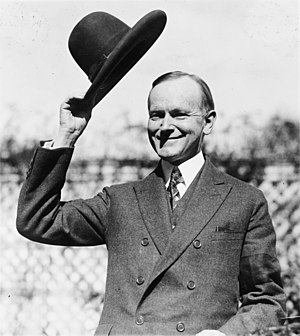| Display title | Calvin Coolidge |
| Default sort key | Calvin Coolidge |
| Page length (in bytes) | 7,982 |
| Namespace ID | 0 |
| Page ID | 173882 |
| Page content language | en - English |
| Page content model | wikitext |
| Indexing by robots | Allowed |
| Number of redirects to this page | 0 |
| Counted as a content page | Yes |
| Number of subpages of this page | 2 (0 redirects; 2 non-redirects) |
| Page image |  |
| Edit | Allow all users (infinite) |
| Move | Allow all users (infinite) |
| Delete | Allow all users (infinite) |
| Page creator | m>Import Bot |
| Date of page creation | 21:27, 1 November 2013 |
| Latest editor | Robkelk (talk | contribs) |
| Date of latest edit | 16:49, 17 May 2024 |
| Total number of edits | 23 |
| Recent number of edits (within past 180 days) | 1 |
| Recent number of distinct authors | 1 |
Description | Content |
Article description: (description)
This attribute controls the content of the description and og:description elements. | Sworn in by his father, a Justice of the Peace, late at night, on the Coolidge family bible, after hearing of Harding's death, John Calvin Coolidge, Jr. (1872 – 1933) may have represented the real return to normalcy; one of his slogans was "Keep Cool With Coolidge." He was popular in his day, but due to his lack of charisma he's not remembered much now. Most people remember Prohibition and the rest of The Roaring Twenties instead. If they do remember him, it is for his legendarily taciturn temperament, which earned him the nickname "Silent Cal". Like most old-fashioned New Englanders, he never used twenty words when one would do the trick, and never used ten words when a simple nod would suffice. This also translated to his philosophy of governance, which was to do as little as necessary, on the grounds that 90% of impending problems would solve themselves before they ever became serious (a philosophy that made him, reportedly, the favorite modern President of Ronald Reagan). Partially as a result of this hands-off philosophy, he has been described as being, historically, more relevant as a source of amusing anecdotes than as a president. |
